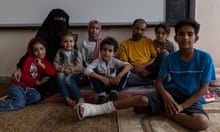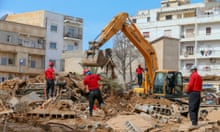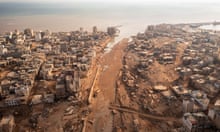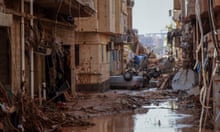The UN secretary general, António Guterres, has appealed for calm as street demonstrations spread across Libya in protest over power cuts and the failure to hold national elections.
Talks between the Libyan factions in Geneva convened by the UN special adviser Stephanie Williams made progress last week but without agreement on a constitution for the elections.
On Friday night, protesters stormed the parliament in the eastern city of Tobruk as anger exploded over deteriorating living conditions and the political deadlock.
“The secretary general is following with concern the demonstrations that were held in several cities in Libya, including Tripoli, Tobruk and Benghazi,” the office of Guterres said in a statement.
The UN chief called on protesters “to avoid acts of violence and on the security forces to exercise utmost restraint”.
According to the statement, Guterres also urged “Libyan actors to come together to overcome the continued political deadlock”, which was negatively “deepening division”.
Libyan protesters, after a year of comparative calm in the face of interminable political infighting, appear to have lost patience with the political class, saying they would continue to demonstrate until all the ruling elites had left power.
Williams had hoped that elections slated for December would lead to a changing of the guard in the country, but disputes over the constitution, the eligibility of certain presidential candidates, and the dominance of the old figures who have controlled the political landscape over the past decade led to their cancellation.
Since the failure to hold the elections, Williams has been trying to persuade factions in the east and west of the country to agree on a future constitution for the country as a prerequisite for staging the election.
Ultimately, it might be the street protests, including the storming of the parliament in Tobruk on Friday, that galvanise the political elite into making the necessary compromises.
This weekend, protesters held their biggest rallies in years in the capital, Tripoli, chanting slogans against Libya’s feuding political elites, while demonstrators blocked off roads in Benghazi and Misrata and set fire to government buildings in Sebha and Qarabuli.
“We affirm our determination to continue the path of peaceful demonstration until the last breath to achieve our goals,” said the Beltrees youth movement, a group of online activists angry over living conditions.
It said it would occupy city streets and squares until all the ruling political bodies “announce their resignation in public”.
The country is divided between the eastern-based House of Representatives that appointed Fathi Bashagha as prime minister, and the Tripoli-based interim government led by Abdul Hamid Dbeibah.
As part of an earlier agreement, Dbeibah had committed to stand down when the elections were held but then refused to do so, after which Bashaga made a foiled attempt to capture Tripoli.
Dbeibah said on Friday that all members of Libya’s political institutions should quit and hold elections, but Williams said there was no option but to agree on a constitutional framework in order to hold the first presidential elections in the country’s history. “The only way to get true legitimacy is through the ballot box,” she said. She warned that the poorest and most deprived had been left on the margins by the political disputes.
Neither the Tobruk parliament nor the western-based High State Council can claim credible mandates to remain in power as they were elected as far back as 2011, but the previous absence of visible public anger has so far left the existing class safe in power, using patronage and access to Libya’s vast oil wealth to dispense largesse to key groups.









